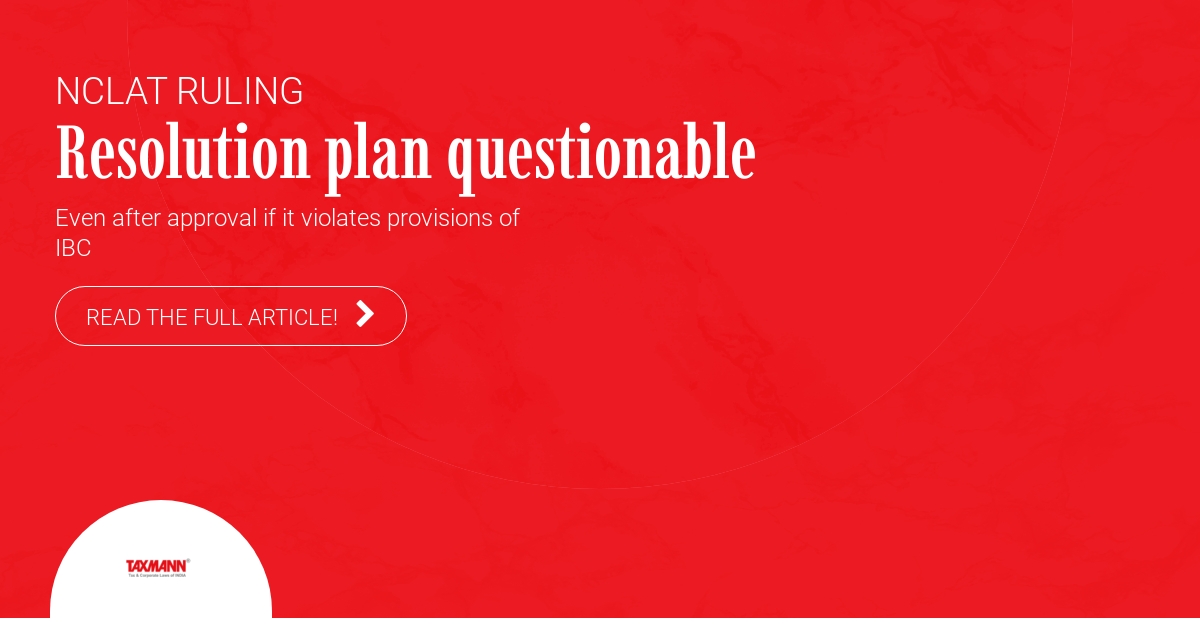Resolution plan questionable even after approval if it violates provisions of IBC: NCLAT
- Blog|News|Insolvency and Bankruptcy Code|
- 3 Min Read
- By Taxmann
- |
- Last Updated on 30 March, 2022

Case Details: IDBI Bank v. Ms. Mamta Binani, Resolution Professional of Deccan Chronicle Holdings Ltd - [2022] 136 taxmann.com 192 (NCLAT- New Delhi)
Judiciary and Counsel Details
-
- Jarat Kumar Jain, Judicial Member and Dr. Ashok Kumar Mishra, Technical Member
- Anugrah Robin Frey, Adv. for the Appellant.
- Abhijeet Sinha, Siddharth Sharma, Arjun Asthana, Saikat Sarkar, Ms. Mamta Binani, Rishav Banerjee, Saptarshi Mandal, PBA Srinivasan, Parth D Tandon, Miss. P.S. Chandralekha, Miss. Sneha R. Iyer, Advs. for the Respondent.
Facts of the Case
In the instant case, CIRP plea was initiated against the Corporate Debtor pursuant to an application filed under section 7. The respondent No. 2 was declared as successful resolution applicant. In resolution plan, the financial creditors were classified as FC category A and FC category B on basis of security held by creditors and accordingly Canara Bank got more amount than the appellant-IDBI bank.
The Appellant-IDBI Bank filed an application before the NCLT objecting to resolution plan furnished by the resolution applicant. The NCLT by an impugned order dismissed the said application on ground that grouping of the financial creditor did not amount to any discrimination and that creditors who were having valuable assets were to be given higher percentage from out of resolution fund than those who were holding less value of assets.
NCLAT Held
The Appellant Tribunal held that since the appellant had exclusive charge over trademarks of the corporate debtor, there was no justification in Canara Bank getting more amount in comparison to the appellant and, thus, the resolution plan was discriminatory between two set of creditors similarly situated and was in violation of IBC.
It was held further that since categorisation of financial creditors was not based on sound principle and the resolution plan discriminated between the two financial creditors who were similarly situated, the appellant could question the resolution plan even if it was approved by CoC.
The Tribunal ruled that since resolution plan was not in conformity with amended section 30(4) and regulation 38(1) of IBBI (Insolvency Resolution Process for Corporate Persons) Regulations, 2016, therefore, impugned order was not sustainable in law as well as on facts.
Case Review
-
- IDBI Bank v. Mamta Binani [2022] 136 taxmann.com 191 (NCLA – HDB) (para 77) set aside [See Annex].
List of Cases Referred to
-
- Committee of Creditors of Essar Steel India Ltd. v. Satish Kumar Gupta [2019] 111 taxmann.com 234 (SC) (para 20)
- Swiss Ribbons (P.) Ltd. v. Union of India [2019] 101 taxmann.com 389/152 SCL 365 (SC) (para 20)
- Binani Industries Ltd. v. Bank of Baroda [2018] 99 taxmann.com 164/150 SCL 703 (NCLAT – New Delhi) (para 20)
- Rajputana Properties (P.) Ltd. v. Ultratech Cement Ltd. [Civil Appeal No. 10998 of 2018, dated 19-11-2018] (para 20)
- Trojan & Co. Ltd. v. N. Nagappa Chettiar AIR 1953 SC 235 (para 28)
- Bachhaj Nahar v. Nilima Mandal [2008] 17 SCC 491 (para 28)
- Kalyan Singh Chouhan v. C.P. Joshi [2011] 11 SCC 786 (para 28)
- Arkala Narasa Reddy v. Venkataram Reddy Reddygari [2014] 5 SCC 312 (para 28)
- Pratap Technocrats (P.) Ltd. v. Monitoring Committee of Reliance Enfratel Ltd. [2021] 129 taxmann.com 132/167 SCL 508 (SC) (para 30)
- Jaypee Kensington Boulevard Apartments Welfare Association v. NBCC (India) Ltd. [2021] 125 taxmann.com 360/166 SCL 678 (SC) (para 30)
- India Resurgence Arc (P.) Ltd. v. Amit Metaliks Ltd. [2021] 127 taxmann.com 610/167 SCL 223 (SC) (para 31)
- K. Shashidhar v. Indian Overseas Bank [2019] 102 taxmann.com 139/152 SCL 312 (SC) (para 42).
Disclaimer: The content/information published on the website is only for general information of the user and shall not be construed as legal advice. While the Taxmann has exercised reasonable efforts to ensure the veracity of information/content published, Taxmann shall be under no liability in any manner whatsoever for incorrect information, if any.

Taxmann Publications has a dedicated in-house Research & Editorial Team. This team consists of a team of Chartered Accountants, Company Secretaries, and Lawyers. This team works under the guidance and supervision of editor-in-chief Mr Rakesh Bhargava.
The Research and Editorial Team is responsible for developing reliable and accurate content for the readers. The team follows the six-sigma approach to achieve the benchmark of zero error in its publications and research platforms. The team ensures that the following publication guidelines are thoroughly followed while developing the content:
- The statutory material is obtained only from the authorized and reliable sources
- All the latest developments in the judicial and legislative fields are covered
- Prepare the analytical write-ups on current, controversial, and important issues to help the readers to understand the concept and its implications
- Every content published by Taxmann is complete, accurate and lucid
- All evidence-based statements are supported with proper reference to Section, Circular No., Notification No. or citations
- The golden rules of grammar, style and consistency are thoroughly followed
- Font and size that’s easy to read and remain consistent across all imprint and digital publications are applied



 CA | CS | CMA
CA | CS | CMA
